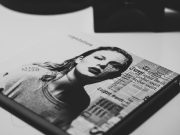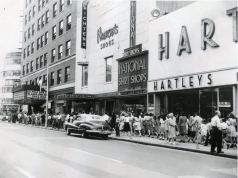Video by Sophia Lama. Story by Rachel Rodriguez.
Valeriia Popova, 29, is an advocate for free speech and an avid supporter of Ukraine as the country faces brutal force from Russia. Ironically, she was born in Russia and used to work for the Kremlin, aiding in the spread of propaganda.
“I took a step back and thought, ‘What the hell am I doing,’” says Popova. “How moral is what I’m doing?’”
It is her past that makes her passionate about the cause. While many Russians today believe in the misinformation that is spread by the Kremlin, Popova stands against it due to her experiences.
“I believe in democracy,” stated Popova, now a doctoral candidate at Florida International University but still a Russian citizen. “I just wanted to come to a society that would make me feel freedom…I don’t regret it at all. I enjoy it here…I just wanted to live in a free society…where I can speak my mind.”
(This is the second in a series on the Ukraine, Russia conflict. For part 1, click here.)
As an employee of the Kremlin less than decade ago, Popova spoke with journalists and edited their stories in order to represent the government in a favorable light to the public. However, after gaining more access to knowledge and becoming more politically conscious as she got older, she chose to leave her homeland.
Now that the Kremlin is spreading lies and deception through propaganda, she stands against Putin as a supporter of Ukraine by voicing her experiences through interviews and discussion panels.
Popova has faced many hardships in her life. She was born on June 22, 1992 to two alcoholic parents. At age 5 she was placed in an orphanage along with her siblings, but never had the chance to truly connect with them.
There, she grew up in a fenced environment, with limited access to knowledge until she turned 18. After leaving the orphanage, she attended Peoples’ Friendship University of Russia, leading to her working with the Kremlin. She got the job by showing up unexpectedly.
“One day, I just came and literally knocked on their door,” recounts Popova. “You know, I can honestly say that those were interesting and even happy times.”
Popova became a public relations specialist. While the work she did in propaganda was very minor – such as changing a few facts to fit a specific context – the moral strain of her work eventually took its toll.
She recalls that a tipping point arrived when a “guy who was responsible for establishing all the gas prices in Russia for several decades” began consorting with elite prostitutes from all over Europe as bribes to favor some businesses.
“Someone broke into his phone, took screenshots of everything that was going on…and posted it on the internet,” she recalls. “We were supposed to cover up for the story…I was doing that for a couple of days, and I was feeling so uncomfortable…that was when I quit.”
Popova had sampled life in the United States once when she was on break in college. She lived in New York for three months and experienced a major culture shock.
But more importantly, she saw how democracy could run. After seeing firsthand the many different points of view that American citizens have to, Popova compared it to her own experiences.
“Most of my work was essentially proactive…we had our own pool of journalists…we usually don’t expect anything mean from them, there’s just this agreement…we know them personally,” she says. “It should be like [an adversarial relationship] – in a democracy that is exactly the point! The government and the journalists compete.”
After years of working in Russian propaganda and feeling more disillusioned with the country’s government, she left her country and settled in the United States in 2016.
In her present role as a doctoral student who teaches American government and comparative politics at Florida International University, she continues to inspire many people, including Susan Jacobson, a member of Popova’s dissertation committee and the interim chair for the Department of Journalism and Media at FIU.
“It’s interesting, she’s very fiery and independent,” says Jacobson. “You can see that in her presentation…She has navigated the different personalities on her committee very well. Even though she’s very strong and direct, she’s also very savvy.”
However, the current crisis that has erupted due to the Russian-Ukrainian war has made Popova more vocal than ever about preserving democracy and freedom of speech. She has appeared as a guest on numerous discussions relating to the conflict. And her personal experience puts a greater emphasis on why it is so important to protect a true democracy.
“By the time I became politically conscious, I pretty much hated [Vladimir Putin], so I never voted for him, I was always critical of his methods,” Popova says. “Allowing media to speak what they want, even if you disagree with their stuff…you cannot shut them down because that is becoming censorship and that is a dictatorship.”
In fact, this is a sentiment both she and her friend, Mazaher Koruzhde, share. Popova met Koruzhde at FIU, and he is a partner as well as a member of the international circle of friends who helped broaden her political knowledge and awareness.
Koruzhde is from Iran and was a part of the Green Movement in opposition to that nation’s government. Since both Iran and Russia heavily influenced their citizens’ knowledge through constant propaganda, the pair shares ideal that preserving democracy is important to maintain civil rights.
“I had a talk in Valeriia’s class a month ago about civil liberties and citizenship in general, how being a citizen is different here than it is in Iran,” Koruzhde said. “And the stuff that I saw here blew my mind with how different society can be – how different you as a person, as a citizen can be. You should go to countries like Iran and stay for a month – even for a week. You are going to realize how different that society is from yours so that you would appreciate this society.”
Popova is not a citizen of the United States. She doesn’t even have a green card. Yet because of her experiences, she recognizes the value of the democracy and freedoms America grants to its citizens – perhaps even more so than those born in the country. She, along with her friends, aims to get full citizenship in order to feel secure about never having to go back to the oppressive life in Russia.
Her passion for freedom of speech drives her to be vocal about the events she is witnessing today. She believes that America’s democracy will last. And she will continue to preach this belief to her students, her friends, and those around her.
“Take care of this country, seriously,” Popova states. “I have talked to a lot of Americans, especially a lot of young guys, and they’ve told me ‘Oh we don’t care, we don’t read the news, we don’t participate in politics…it’s very disheartening. I know you live in a very stable country…You live in an amazing place, you have to cherish it…It’s so easy to overlook it…take care of your democracy.”































